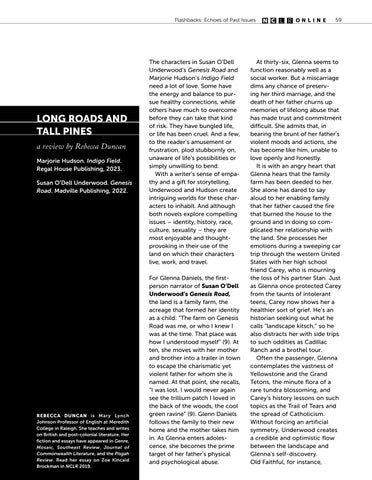Flashbacks: Echoes of Past Issues
LONG ROADS AND TALL PINES a review by Rebecca Duncan Marjorie Hudson. Indigo Field. Regal House Publishing, 2023. Susan O’Dell Underwood. Genesis Road. Madville Publishing, 2022.
REBECCA DUNCAN is Mary Lynch Johnson Professor of English at Meredith College in Raleigh. She teaches and writes on British and post-colonial literature. Her fiction and essays have appeared in Genre, Mosaic, Southeast Review, Journal of Commonwealth Literature, and the Pisgah Review. Read her essay on Zoe Kincaid Brockman in NCLR 2019.
The characters in Susan O’Dell Underwood’s Genesis Road and Marjorie Hudson’s Indigo Field need a lot of love. Some have the energy and balance to pursue healthy connections, while others have much to overcome before they can take that kind of risk. They have bungled life, or life has been cruel. And a few, to the reader’s amusement or frustration, plod stubbornly on, unaware of life’s possibilities or simply unwilling to bend. With a writer’s sense of empathy and a gift for storytelling, Underwood and Hudson create intriguing worlds for these characters to inhabit. And although both novels explore compelling issues – identity, history, race, culture, sexuality – they are most enjoyable and thoughtprovoking in their use of the land on which their characters live, work, and travel. For Glenna Daniels, the firstperson narrator of Susan O’Dell Underwood’s Genesis Road, the land is a family farm, the acreage that formed her identity as a child: “The farm on Genesis Road was me, or who I knew I was at the time. That place was how I understood myself” (9). At ten, she moves with her mother and brother into a trailer in town to escape the charismatic yet violent father for whom she is named. At that point, she recalls, “I was lost. I would never again see the trillium patch I loved in the back of the woods, the cool green ravine” (9). Glenn Daniels follows the family to their new home and the mother takes him in. As Glenna enters adolescence, she becomes the prime target of her father’s physical and psychological abuse.
N C L R ONLINE
59
At thirty-six, Glenna seems to function reasonably well as a social worker. But a miscarriage dims any chance of preserving her third marriage, and the death of her father churns up memories of lifelong abuse that has made trust and commitment difficult. She admits that, in bearing the brunt of her father’s violent moods and actions, she has become like him, unable to love openly and honestly. It is with an angry heart that Glenna hears that the family farm has been deeded to her. She alone has dared to say aloud to her enabling family that her father caused the fire that burned the house to the ground and in doing so complicated her relationship with the land. She processes her emotions during a sweeping car trip through the western United States with her high school friend Carey, who is mourning the loss of his partner Stan. Just as Glenna once protected Carey from the taunts of intolerant teens, Carey now shows her a healthier sort of grief. He’s an historian seeking out what he calls “landscape kitsch,” so he also distracts her with side trips to such oddities as Cadillac Ranch and a brothel tour. Often the passenger, Glenna contemplates the vastness of Yellowstone and the Grand Tetons, the minute flora of a rare tundra blossoming, and Carey’s history lessons on such topics as the Trail of Tears and the spread of Catholicism. Without forcing an artificial symmetry, Underwood creates a credible and optimistic flow between the landscape and Glenna’s self-discovery. Old Faithful, for instance,
